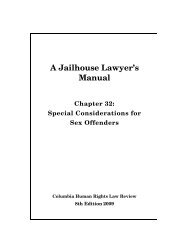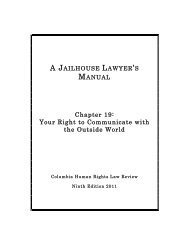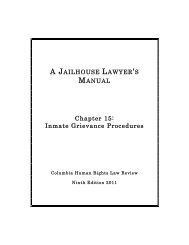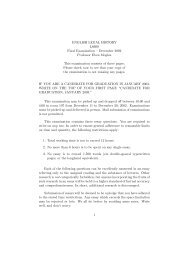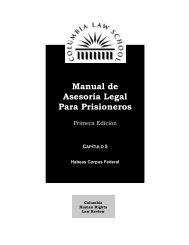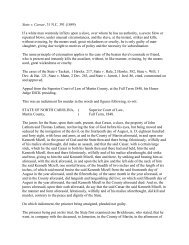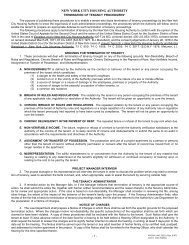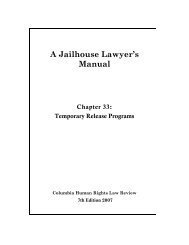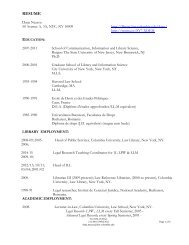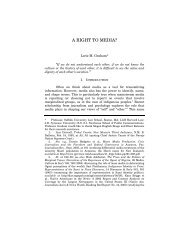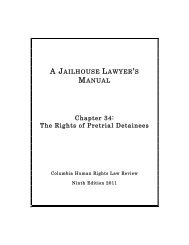The Right to Dignity Rex D. Glensy - Columbia Law School
The Right to Dignity Rex D. Glensy - Columbia Law School
The Right to Dignity Rex D. Glensy - Columbia Law School
Create successful ePaper yourself
Turn your PDF publications into a flip-book with our unique Google optimized e-Paper software.
2011] <strong>The</strong> <strong>Right</strong> <strong>to</strong> <strong>Dignity</strong> 119<br />
embodied not only in the Constitution, but also in all of American<br />
jurisprudence both at the federal and state levels. <strong>The</strong> evidence of<br />
this can be seen both in the vast body of interpretative law that exists<br />
visàvis the Constitution and that rejects that this contains notions<br />
of positive rights, 249 but also in traditional common law rules, such as<br />
that which imposes no liability on someone who had the opportunity<br />
<strong>to</strong> offer help <strong>to</strong> a person in need but refused <strong>to</strong> do so. In other words,<br />
the communitarian, societybuilding ethos inherent in the objective<br />
right <strong>to</strong> dignity does not seem <strong>to</strong> have developed firm roots within the<br />
fabric of American law. Generally speaking, this criticism is factually<br />
and descriptively accurate, but ignores the normative dimension of<br />
the issue. Rather than preemptively shutting the door on the<br />
conversation pertaining <strong>to</strong> dignity rights with the axiomatic “we’ve<br />
never done it this way,” it would be more advisable <strong>to</strong> let the<br />
developments in this direction take place organically, and then<br />
reevaluate their viability. After all, legal experimentation is a staple<br />
of American jurisprudence and this would fit squarely within the<br />
parameters of past and present legal rules.<br />
One remaining criticism involves the claim that a positive<br />
right <strong>to</strong> dignity will fling wide open the courthouse doors <strong>to</strong> all flimsy<br />
and dubious claims that can perceivably, if improbably, be linked <strong>to</strong><br />
the right <strong>to</strong> dignity. <strong>The</strong> first answer <strong>to</strong> this is that courts already<br />
deal with abusive claims under other rights on a daily basis, and the<br />
same process would play out in the context of the right <strong>to</strong> dignity as<br />
well, so that ridiculous or farcical claims would be dealt with early<br />
and decisively. A second answer would be <strong>to</strong> observe what has<br />
happened in countries that have already embarked on this<br />
jurisprudential journey. <strong>The</strong> German Constitutional Court (with<br />
arguably the strongest dignity jurisprudence in the world along with<br />
South Africa) has had <strong>to</strong> contend with these kinds of claims and has<br />
uniformly rejected them. Thus, that court has found that the<br />
changing of the title of certain judges, the obligation <strong>to</strong> attend traffic<br />
school, and the requirement <strong>to</strong> bury the ashes of the dead in a<br />
cemetery did not violate the right <strong>to</strong> dignity. 250<br />
249. See, e.g., Harris v. McRae, 448 U.S. 297, 316 (1980) (“it simply does<br />
not follow that a woman’s freedom of choice [<strong>to</strong> have an abortion] carries with it a<br />
constitutional entitlement <strong>to</strong> the financial resources <strong>to</strong> avail herself of the full<br />
range of protected choices.”).<br />
250. See Kommers, supra note 149, at 550 n. 59 (citing<br />
Bundesverfassungsgericht [BVerfGE] [Federal Constitutional Court] 1974, 38<br />
BVerfGE 1 (Ger.) (judge’s title); Bundesverfassungsgericht [BVerfGE] [Federal<br />
Constitutional Court] 1970, 22 BVerfGE 21 (Ger.) (traffic school);



